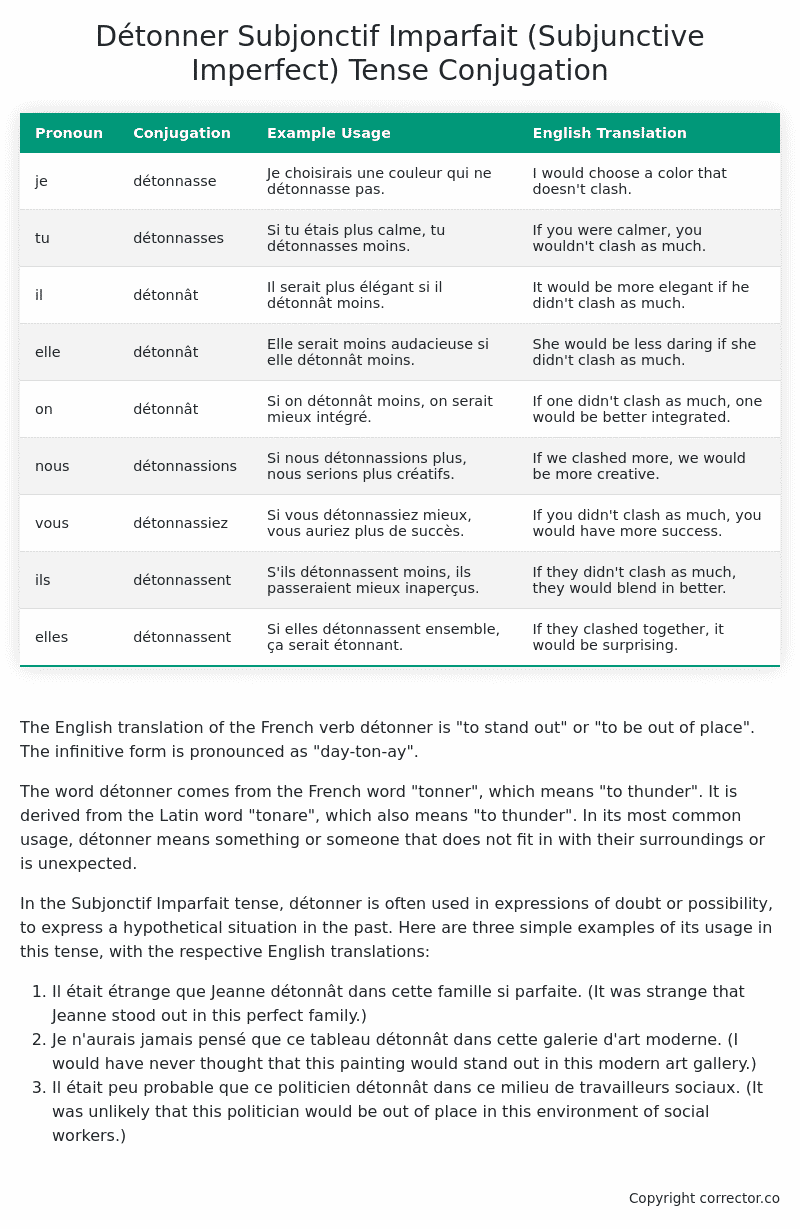Subjonctif Imparfait (Subjunctive Imperfect) Tense Conjugation of the French Verb détonner
Introduction to the verb détonner
The English translation of the French verb détonner is “to stand out” or “to be out of place”. The infinitive form is pronounced as “day-ton-ay”.
The word détonner comes from the French word “tonner”, which means “to thunder”. It is derived from the Latin word “tonare”, which also means “to thunder”. In its most common usage, détonner means something or someone that does not fit in with their surroundings or is unexpected.
In the Subjonctif Imparfait tense, détonner is often used in expressions of doubt or possibility, to express a hypothetical situation in the past. Here are three simple examples of its usage in this tense, with the respective English translations:
- Il était étrange que Jeanne détonnât dans cette famille si parfaite. (It was strange that Jeanne stood out in this perfect family.)
- Je n’aurais jamais pensé que ce tableau détonnât dans cette galerie d’art moderne. (I would have never thought that this painting would stand out in this modern art gallery.)
- Il était peu probable que ce politicien détonnât dans ce milieu de travailleurs sociaux. (It was unlikely that this politician would be out of place in this environment of social workers.)
Table of the Subjonctif Imparfait (Subjunctive Imperfect) Tense Conjugation of détonner
| Pronoun | Conjugation | Example Usage | English Translation |
|---|---|---|---|
| je | détonnasse | Je choisirais une couleur qui ne détonnasse pas. | I would choose a color that doesn’t clash. |
| tu | détonnasses | Si tu étais plus calme, tu détonnasses moins. | If you were calmer, you wouldn’t clash as much. |
| il | détonnât | Il serait plus élégant si il détonnât moins. | It would be more elegant if he didn’t clash as much. |
| elle | détonnât | Elle serait moins audacieuse si elle détonnât moins. | She would be less daring if she didn’t clash as much. |
| on | détonnât | Si on détonnât moins, on serait mieux intégré. | If one didn’t clash as much, one would be better integrated. |
| nous | détonnassions | Si nous détonnassions plus, nous serions plus créatifs. | If we clashed more, we would be more creative. |
| vous | détonnassiez | Si vous détonnassiez mieux, vous auriez plus de succès. | If you didn’t clash as much, you would have more success. |
| ils | détonnassent | S’ils détonnassent moins, ils passeraient mieux inaperçus. | If they didn’t clash as much, they would blend in better. |
| elles | détonnassent | Si elles détonnassent ensemble, ça serait étonnant. | If they clashed together, it would be surprising. |
Other Conjugations for Détonner.
Le Present (Present Tense) Conjugation of the French Verb détonner
Imparfait (Imperfect) Tense Conjugation of the French Verb détonner
Passé Simple (Simple Past) Tense Conjugation of the French Verb détonner
Passé Composé (Present Perfect) Tense Conjugation of the French Verb détonner
Futur Simple (Simple Future) Tense Conjugation of the French Verb détonner
Futur Proche (Near Future) Tense Conjugation of the French Verb détonner
Plus-que-parfait (Pluperfect) Tense Conjugation of the French Verb détonner
Passé Antérieur (Past Anterior) Tense Conjugation of the French Verb détonner
Futur Antérieur (Future Anterior) Tense Conjugation of the French Verb détonner
Subjonctif Présent (Subjunctive Present) Tense Conjugation of the French Verb détonner
Subjonctif Passé (Subjunctive Past) Tense Conjugation of the French Verb détonner
Subjonctif Imparfait (Subjunctive Imperfect) Tense Conjugation of the French Verb détonner (this article)
Subjonctif Plus-que-parfait (Subjunctive Pluperfect) Tense Conjugation of the French Verb détonner
Conditionnel Présent (Conditional Present) Tense Conjugation of the French Verb détonner
Conditionnel Passé (Conditional Past) Tense Conjugation of the French Verb détonner
L’impératif Présent (Imperative Present) Tense Conjugation of the French Verb détonner
L’infinitif Présent (Infinitive Present) Tense Conjugation of the French Verb détonner
Struggling with French verbs or the language in general? Why not use our free French Grammar Checker – no registration required!
Get a FREE Download Study Sheet of this Conjugation 🔥
Simply right click the image below, click “save image” and get your free reference for the détonner Subjonctif Imparfait tense conjugation!

Détonner – About the French Subjonctif Imparfait (Subjunctive Imperfect) Tense
Formation
Common Everyday Usage Patterns
Interactions with Other Tenses
Subjonctif Présent
Indicatif Passé Composé
Conditional
Conditional Perfect
Summary
I hope you enjoyed this article on the verb détonner. Still in a learning mood? Check out another TOTALLY random French verb conjugation!


